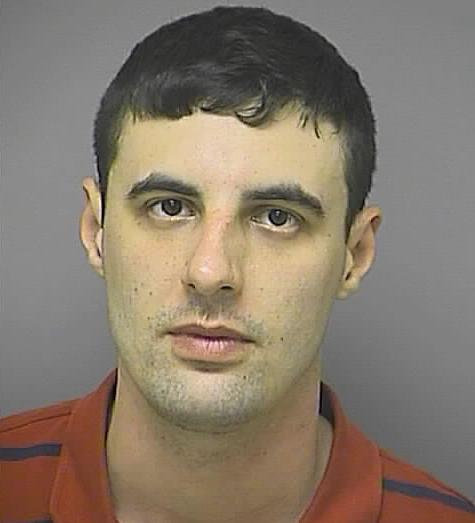Christopher Alan Gillette is in a world of hurt. He’s also in a world of trouble. And they both stem from the same place: The inability of the former U.S. Army soldier to get help from the Department of Veterans Affairs for sciatic pain he describes as unbearable.
Gillette’s physical problems turned into a different kind of pain on March 1 during an 8 a.m. history class at the Denton campus of Texas Woman’s University, where he’d enrolled just two months earlier. According to witness reports published in The Lasso, the TWU student paper, Gillette stood up shortly after the class convened and began telling his professor, Dr. Paul Travis, that he was in a lot of pain and could not get the help that he deserved as a veteran.
 At one point, witnesses said, Gillette suggested that while he would not hurt anyone at the school, he felt like taking an (army issue) AR-15 to Washington, D.C. and taking the place down brick by brick.
At one point, witnesses said, Gillette suggested that while he would not hurt anyone at the school, he felt like taking an (army issue) AR-15 to Washington, D.C. and taking the place down brick by brick.
Travis tried to get him to calm down, to no avail. Gillette spoke for several minutes, then left the class and headed to the Veterans Administration Hospital in Dallas, seeking treatment.
After that, campus police were called and the school was locked down for over an hour, until Gillette was located and detained by Veterans Affairs security officers, who had been alerted that Gillette had allegedly made a threat and might show up seeking treatment.
Gillette’s attorney, David B. Sloane, and Gillette’s father, Phillip Gillette, of Little Rock, Ark., both said Gillette made at least six attempts to get help from the VA while living in Arkansas and three additional times since moving to Denton to attend TWU. He served in the National Guard, got hurt during physical training, and was honorably discharged in 2007.
But according to Sloane, none of those attempts produced the treatment he needed, something Sloane says is indefensible for an honorably discharged veteran. “I’ve talked with him. He’s in constant and excruciating pain,” Sloane told Fort Worth Weekly. “This isn’t something he should have to deal with privately.”
According to a statement provided by the public affairs officer at the hospital, the VA officers “were able to quickly detain the person in question without incident or harm to himself or others. No weapons were found and the person is being evaluated.”
The evaluation lasted only as long as it took for the TWU police to arrive. The VA officers then turned Gillette over to the TWU officers, who arrested him. He was taken to the Denton County Jail, charged with making a “terroristic threat” and bond was set at $250,000. He did not make the bond; he has a bond reduction hearing set for April 8.
Gillette has been charged with a third-degree felony, which carries a sentence, on conviction of two to 10 years. A grand jury will begin considering this week whether to indict him.
Sloane, of Dallas, was livid when he discovered that his client was being charged with a felony. He said he’d expected the charge to be no worse than a Class A misdemeanor, which carries a maximum term of one year in the county jail.
“That’s just crazy! A felony for saying how he felt?” Sloane said.
Under the Texas Penal Code, a person can be charged with a Class B terroristic threat misdemeanor if the threat is meant to cause fear of imminent bodily harm to a person or if it’s intended to cause a reaction of any type by an official or volunteer agency organized to deal with emergencies. A Class A misdemeanor is charged when the threat interrupts the occupation of a public place. A third-degree felony is reserved for those terroristic threats that “cause impairment or interruption of public communications, public transportation, public water, gas or power supply or other public service.”
A spokesperson for the Denton County District Attorney’s office, who declined to give her name, said it wasn’t a decision by that agency to charge Gillette with a felony instead of a misdemeanor. “It came to us as a third-degree felony, and we’ll present it to the grand jury as that,” because that’s what TWU campus police charged Gillette with. “That’s why the bond is so high as well. It’s a felony-type bond,” she said.
“Normally, that would be unheard of,” explained a Denton defense attorney who asked not to be named. “The police arrest a person on suspicion of something, then the prosecutors review it and determine the charge. But the colleges are local powerhouses in Denton and what they want, they get.”
“What you’ve got,” said Sloane, “is someone who needs medical help, not incarceration. He has no priors [convictions], he didn’t threaten to hurt anyone — saying you feel like something is not a threat — and he has a good service record. Why the high bail? Why the felony charge? Why not medical attention?”
Gillette’s service record includes three years with the Army, between October 1999 and October 2002, when he served with the 82nd Airborne Division. He was stationed for six months in Kosovo on a peace-keeping missing during that time, and was awarded an honorable discharge. As part of his obligation to the Army, he joined the Arkansas National Guard in 2005 and served two additional years there.











